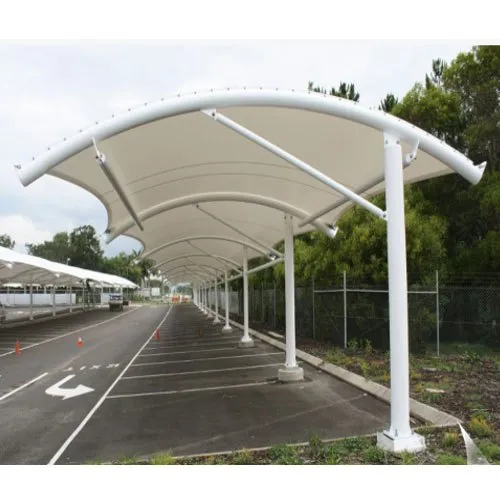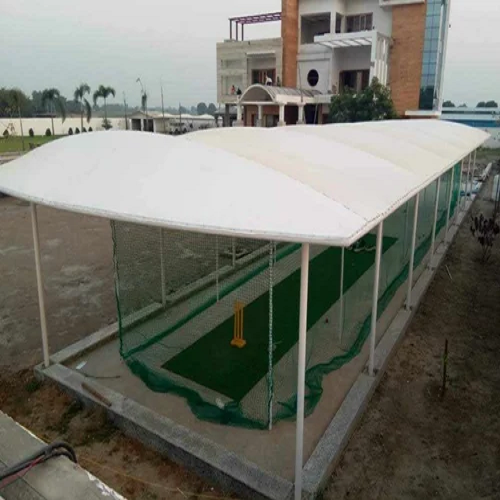Car Parking Tensile Structure 1
Introduction to Car Parking Tensile Structures
A Car Parking Tensile Structure is a type of architectural design that uses tensioned fabric materials to create sheltered parking spaces. These structures are often supported by steel or aluminum frames that hold the fabric in place, creating large, open spaces with minimal support pillars. This type of structure is especially popular for outdoor parking areas, as it provides protection for vehicles from the elements such as sunlight, rain, snow, and hail. The tensile fabric allows for flexibility in design while offering a visually appealing and functional solution.
Benefits of Car Parking Tensile Structures
-
Weather Protection:
- UV and Sun Protection: Tensile structures are designed to protect vehicles from harmful UV rays, which can damage car paint and interiors over time. By providing shade, they help maintain the exterior and interior condition of vehicles.
- Rain and Snow Protection: These structures shield vehicles from heavy rain, snow, and hail, ensuring that cars remain dry and protected, reducing the risk of rust and other weather-related damages.
- Temperature Regulation: Tensile structures can also reduce the buildup of heat in parking areas, keeping the temperature more stable compared to open-air parking lots, which can be excessively hot during the summer months.
-
Space Efficiency:
- Minimal Support Pillars: Tensile structures use a minimal number of support pillars or columns, which allows for larger, open parking areas. This design maximizes the space available for parking and reduces the need for unnecessary obstacles, making the area more user-friendly.
- Flexible Design: The versatility of tensile fabric allows these structures to be designed in various shapes and sizes, accommodating different parking layouts and spatial requirements.
-
Cost-Effective Solution:
- Lower Initial Costs: Tensile fabric structures generally cost less to design and install than traditional concrete or steel buildings. The materials used in tensile structures are lightweight, which can reduce transportation and installation costs.
- Energy Efficiency: The reflective properties of the fabric used in tensile structures can help reduce the amount of heat absorbed by the parking area, potentially reducing cooling costs for surrounding buildings.
-
Aesthetic Appeal:
- Modern and Attractive Design: Tensile structures are visually striking and can be customized to fit the architectural style of the surrounding environment. The use of fabric and open, flowing forms creates a contemporary, stylish appearance that enhances the overall look of the parking area.
- Customizable Color Options: The fabric used in tensile structures comes in a variety of colors, allowing property owners to match the structure to their brand or the design of the surrounding area.
-
Durability and Strength:
- Weather-Resistant: The high-performance fabrics used in tensile structures are designed to withstand harsh weather conditions, including strong winds, heavy rain, and intense sunlight. The materials are UV resistant, waterproof, and fire-retardant, ensuring long-lasting durability.
- Low Maintenance: Tensile structures require minimal maintenance. The fabric is typically self-cleaning or easy to wash, and the framework is resistant to rust and corrosion, ensuring longevity.
-
Environmentally Friendly:
- Sustainability: Many tensile fabric materials are made from recyclable and eco-friendly materials. The use of such sustainable materials contributes to a reduced environmental footprint.
- Energy Efficiency: The design of tensile structures allows for natural light to filter through the fabric, reducing the need for artificial lighting during the day. This makes the structures more energy-efficient compared to traditional enclosed parking garages.
Materials Used in Car Parking Tensile Structures
-
PVC (Polyvinyl Chloride) Coated Fabric:
- PVC-coated polyester fabric is one of the most commonly used materials for tensile structures. It is durable, waterproof, UV resistant, and resistant to mildew, making it perfect for outdoor applications like car parking.
- This material is also available in a range of colors and finishes, allowing for customization to match the desired aesthetic.
-
PTFE (Polytetrafluoroethylene) Coated Fabric:
- PTFE-coated fabric is highly durable and resistant to UV radiation, weathering, and fire. It is often used for larger, more permanent tensile structures due to its superior strength and ability to handle extreme weather conditions.
- PTFE fabric is also self-cleaning, meaning it requires less maintenance over time.
-
ETFE (Ethylene Tetrafluoroethylene) Film:
- ETFE is a lightweight, highly transparent plastic film that is often used in tensile structures for its high strength-to-weight ratio. It allows for maximum light transmission, which can help reduce the need for artificial lighting in parking areas.
- ETFE is also resistant to corrosion, UV degradation, and chemical exposure.
-
Steel or Aluminum Frame:
- The frame of a car parking tensile structure is typically made from steel or aluminum, materials known for their strength, durability, and resistance to corrosion. The frame supports the fabric and helps maintain the structural integrity of the covering.
- The frame design can be customized to suit the needs of the parking area, whether it requires a single canopy, multiple bays, or a more complex design.
Design Variations of Car Parking Tensile Structures
-
Single-Skin Canopy:
- This design features a single layer of tensile fabric stretched over the framework. It is the most basic design and is typically used for smaller parking areas or individual parking spots.
- Single-skin canopies are lightweight, cost-effective, and efficient for providing shade and protection to vehicles.
-
Double-Skin or Multi-Layer Design:
- A double-skin or multi-layer design involves multiple layers of fabric, often with an air gap between them. This design offers enhanced insulation, reducing the heat buildup under the structure.
- It also provides additional durability and can be used for larger parking areas or areas with higher weather extremes.
-
Modular Design:
- Modular tensile structures can be used to create scalable parking solutions. These structures can be expanded or reconfigured as the parking demand grows, making them ideal for projects with future expansion plans.
- Modular designs are adaptable to different site conditions and can be customized in terms of size, layout, and aesthetic.
-
Arch and Tensioned Cable Designs:
- Tensile structures can also be designed in the shape of arches or use tensioned cables for additional support. These designs are typically used for larger-scale parking projects where a more visually dynamic structure is desired.
- Arch and cable designs offer maximum space utilization and can be integrated into more complex architectural settings.
Applications of Car Parking Tensile Structures
-
Commercial Parking:
- Tensile structures are commonly used in shopping malls, office complexes, hotels, and airports where large outdoor parking areas need protection from the elements.
- They provide a modern and efficient solution for high-traffic areas, offering sheltered parking for employees, customers, and visitors.
-
Residential Parking:
- Car parking tensile structures are ideal for residential properties where there is a need to provide shaded parking spaces. They can be used in apartment complexes, gated communities, or private homes to protect vehicles from weather damage.
- Their aesthetic appeal makes them a desirable choice for homeowners looking to enhance the appearance of their parking areas.
-
Public Parking:
- Public parking lots, such as those at recreational centers, transit stations, and event venues, benefit from tensile structures that provide shelter for vehicles in areas with high foot traffic.
- These structures are effective in urban environments where space is limited and providing shelter for large numbers of vehicles is essential.
-
Transportation Hubs:
- Airports, bus terminals, and train stations can use tensile structures for long-term parking areas, ensuring that vehicles remain protected from the elements while parked for extended periods.
Conclusion
A Car Parking Tensile Structure offers a cost-effective, space-efficient, and aesthetically pleasing solution for protecting vehicles from the elements. With its durable materials, weather-resistant properties, and sleek design, this type of structure is ideal for both commercial and residential parking areas. The flexibility and versatility of tensile structures make them an excellent choice for a wide range of applications, providing long-term protection for vehicles while enhancing the visual appeal of the parking environment.
.jpg)











.png)